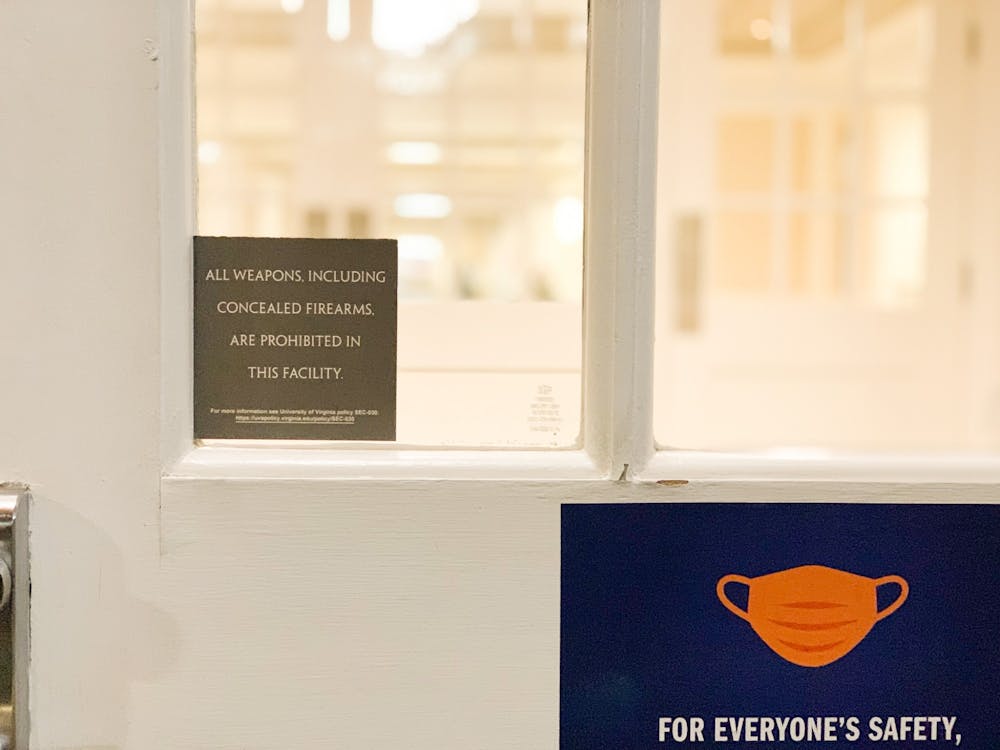Last fall, a University student was seriously wounded by a bullet because of an individual who recklessly handled a firearm at Boylan Heights, an establishment frequented by many University students and other Charlottesville residents. This news was shocking and alarming to everyone in the Charlottesville community, as well as family members and friends of those who live here. Surely, many students reflected on this incident and thought themselves to be lucky that they were not there at the time. This was not only a threat to those present at the bar that night, but also to everyone in the Charlottesville community. Though the perpetrator was not a University student — and the incident did not occur on what is considered University property — the University should work to make our community safe for students, whether or not they are specifically on Grounds.
As a young woman, I am always nervous and on-alert when I have to walk somewhere alone at night. However, now an increasing fear of gun violence presents itself to all students and citizens of Charlottesville. Much of the gun violence that occurs in Charlottesville unfortunately happens very close to University property — in popular bars, off campus apartments and nearby streets.
The University does regulate guns on Grounds, banning the “the possession, storage, or use of any weapon by any University student, faculty, employee, contractor, trainee or volunteer” on University property. However, this policy does not extend outside of University property — current gun laws in the state of Virginia allow for citizens to openly carry a firearm with or without a concealed handgun permit. Although discharging a firearm in public and recklessly handing one are crimes in the state of Virginia, owning and carrying the gun itself is not.
The incident cited above did not happen on Grounds, and the perpetrator was not a University student, faculty, employee, contractor, trainee or volunteer. However, Boylan Heights is just steps away from what is considered University property and the victim who suffered was indeed a student.
Since the University does not have the facilities to provide University owned property for all of its students to live in, as 74 percent of students live off Grounds, it should have rules or policies that protect the students living in off-Grounds housing owned by private rental agencies. For example, one prominent rental agency — CBS Rentals — that many students rent through does not have a policy on firearms. Although the University has no jurisdiction over privately owned properties, a possible step towards a safer community would be for the University to request certain buildings owned by specific rental agencies buildings comply with the University’s gun policy. While the University cannot enforce this, it would put the responsibility on building owners to make their tenants feel safer.
While the University has employed its ambassador program and added a new Community Oriented Policing Squad to patrol Grounds, both services have already been heavily critiqued. The University has yet to take meaningful and effective action in attempting to prevent future incidents like this from happening again.
Several pieces of gun legislation were passed in 2020. For instance, the Red Flag Law protects gun owners from harming themselves or others. Another bill allowed local governments to control firearms in certain areas such as city parks, permitted event areas, and buildings owned or used by the government. While these new laws are aiding in reducing the gun violence epidemic, there is more to be done. For example, a bill that failed in 2020 and could reappear in 2021 is HB1909,which could allow any school board to prohibit possession of a firearm on any property that it owns or leases outside of school zones, similar to the way in which they prohibit firearms inside school zones. If this law is passed, the University could obtain more power to protect students living in the Charlottesville area, and therefore, protect more people from gun violence. The University should push for more legislation to be passed that ensures a safer community.
Although the incident at Boylan Heights was not fatal, it was a horrifying example of how common gun violence is in our everyday lives. This should serve as a call to action and a catalyst to fight for safer gun laws in this state and country for the wellbeing of its citizens. While bills regarding gun safety take a lot of time and effort to pass, banning weapons in University-frequented locations does not have to be an infringement on our 2nd Amendment rights, but rather a necessary step towards ensuring the safety of University students and all Charlottesville residents.
Alexandra Shevloff is a Viewpoint Writer for The Cavalier Daily. She can be reached at opinion@cavalierdaily.com.
The opinions expressed in this column are not necessarily those of The Cavalier Daily. Columns represent the views of the authors alone.







